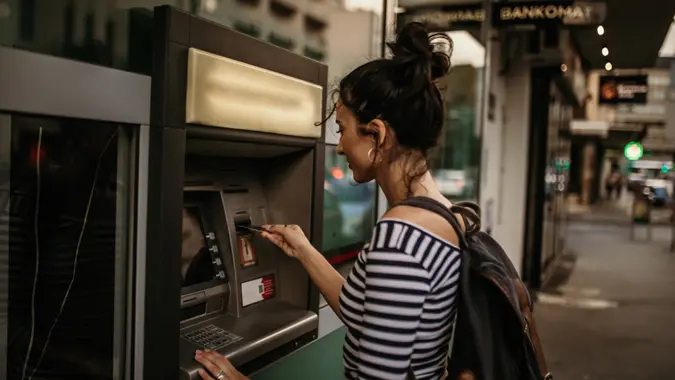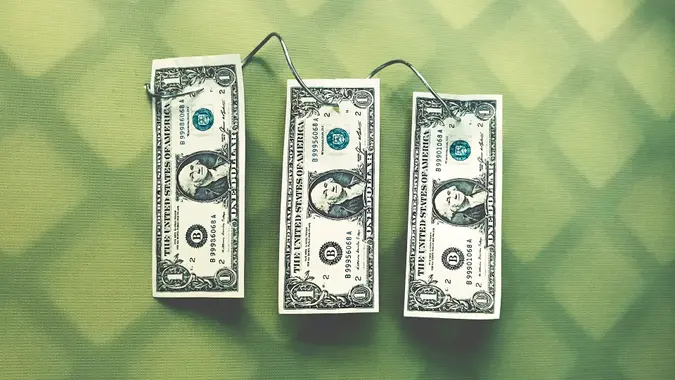You Should Be Changing Your Bank Account Password Often: 6 Reminders

Commitment to Our Readers
GOBankingRates' editorial team is committed to bringing you unbiased reviews and information. We use data-driven methodologies to evaluate financial products and services - our reviews and ratings are not influenced by advertisers. You can read more about our editorial guidelines and our products and services review methodology.

20 Years
Helping You Live Richer

Reviewed
by Experts

Trusted by
Millions of Readers
In an era where our financial lives are increasingly digital, the sanctity of your bank account cannot be overstated. It’s the cornerstone of your personal economy, holding not just your hard-earned money but also sensitive personal data. Thus, adopting robust security practices like regularly changing your bank account password isn’t just advisable–it’s necessary. Here are six reasons why this habit should be a non-negotiable part of your financial routine.
1. An Increase in Scams and Digital Threats
Cyber threats are evolving at an alarming rate. What was secure yesterday may not hold up today. Regularly changing your password is akin to keeping the locks on your digital front door fresh and complex, making it harder for cyber intruders to gain unauthorized access to your bank account.
In addition to direct hacking attempts, the rise in scams such as phishing, malware, and ransomware also poses a significant threat. These scams often rely on various techniques to trick users into voluntarily disclosing their passwords and other credentials.
By regularly updating your password and maintaining vigilance about the security of your digital environments, you can create an ever-shifting target that’s harder to hit. Changing your passwords routinely–using a mix of letters, numbers and special characters–ensures that even if your password were to be compromised, it would limit how useful it would be cybercriminals, and thus, safe from potential fraud..
2. Data Breaches are More Common Than You Think
High-profile data breaches are becoming all too common, with hackers targeting institutions that hold vast amounts of personal data, including bank information. If a service you use experiences a breach, the first line of defense is to change your passwords, especially your bank account password, to prevent unauthorized access.
3. The Ripple Effect of Shared Information
Many people often use the same password across multiple sites for convenience. This habit can backfire spectacularly if even one of these sites is compromised. Changing your bank account password frequently, and keeping it unique from other passwords, significantly reduces the risk of a domino effect from a breach on unrelated sites.
4. Phishing Scams are Getting Smarter
Phishing attempts, where scammers trick you into revealing personal information, including passwords, are increasingly sophisticated. Regularly updating your password can be a simple yet effective countermeasure if you ever inadvertently divulge your details.
5. Browsing the Web in Public
In the age of mobile banking, logging into your account while in public spaces is sometimes unavoidable. Changing your bank account password regularly helps cut down some of the risk posed by “shoulder surfers” who may catch a glimpse of your credentials when you’re browsing the web in a public space.
6. Peace of Mind
By taking proactive steps to protect your personal information, including updating your password, you ensure a more secure future. This practice, fundamental to maintaining digital health, is just as important as, say, double-checking that your doors are locked before bedtime. It’s a simple action that supports a secure financial environment.
How To Change Your Password Effectively
Changing your bank account password regularly is important, but it must be done right. Choose a strong, complex password that mixes letters, numbers, and symbols. Steer clear of common words and personal info that could be guessed. Also, using a reliable password manager can help you securely manage your passwords.
In summary, regularly refreshing your bank account password is essential, not just advisable, for protecting both your finances and personal information. By being vigilant and proactive with your digital security, you’re not only keeping your money safe but also ensuring ongoing peace of mind.
Editor's note: This article was produced via automated technology and then fine-tuned and verified for accuracy by a member of GOBankingRates' editorial team.
 Written by
Written by  Edited by
Edited by 

























